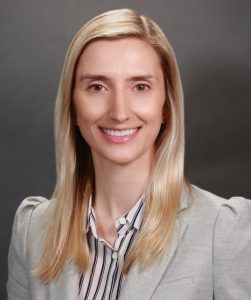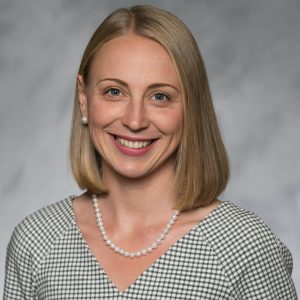Presented by: Alexa Pohl, Professional Development Resident, General Surgery, Stanford University.
Talk Title: “Colonoscopy-based cancer screening: transportation security and social support as social determinants of health”
Bio: Social context creates disparities in cancer care across broad domains: in screening, time to start of treatment, timely receipt of appropriate neoadjuvant, surgical, and adjuvant therapies, and in receipt of surveillance for survivors. Pragmatic, patient-centered research on the root causes of disparities – and rigorous evaluation of policies and programs to address these causes – is needed to reduce preventable cancer mortality. My longstanding interest in health-related disparities and patient-centered research arose while completing my PhD on sex-differential autism risk at the University of Cambridge. I grew uncomfortable with the fact that my research relied on the time and commitment of participants but would never improve their lives directly. As a result, I developed a community-based participatory research study on the experiences of autistic mothers, which received pilot funding from the UK’s National Institute of Healthcare Research (NIHR) Collaboration for Applied Health Research and Care East of England. For me, the natural next step was medical school, where I was surprised to find an intellectual home in surgery. The introspective and self-critiquing nature of the specialty resonated with my desire to ask pragmatic, outcome-focused questions as a researcher and my clinical desire to make a tangible improvement in patients’ lives. Ultimately, I aim to be a practicing surgeon with a productive research program on patient-centered outcomes and the effective and equitable delivery of high-quality oncologic surgical care.
Please refer inquiries to Ana Mezynski at mezynski@stanford.edu
The Weekly WIP has been canceled due to the ACS Clinical Congress.
Each week, S-SPIRE hosts an in-person Work-In-Progress session (WIP) for faculty members and trainees to present their research and receive feedback on projects in every phase of development—from drafting specific aims pages, to parsing grant review committee comments, to abstracts/papers/methods in preparation.
Please refer inquiries to Ana Mezynski at mezynski@stanford.edu
Presented by: Carolyn Seib, Assistant Professor of Surgery, General Surgery, Stanford University
Talk Title: “Improving surgical decision-making for older adults with primary hyperparathyroidism”
Bio: Dr. Carolyn Dacey Seib is a fellowship-trained endocrine surgeon and board certified general surgeon. Her practice is focused on surgery of the thyroid, parathyroid, and adrenal glands.
Dr. Seib has clinical and research expertise in the surgical management of endocrine disorders in older adults, including primary hyperparathyroidism, thyroid cancer, and hyperthyroidism. Dr. Seib completed her undergraduate education at Princeton University, graduating summa cum laude in 2004. She received her M.D. at the New York University School of Medicine and then attended residency in General Surgery at UCSF. Dr. Seib also completed a fellowship in Endocrine Surgery at UCSF, during which she cared for patients with complex disorders of the thyroid, parathyroid, and adrenal glands.
Dr. Seib focuses on providing individualized care for patients with thyroid malignancy, hyperthyroidism, primary hyperparathyroidism, and adrenal disorders. She has received funding from the National Institute on Aging and the American Thyroid Association to study the surgical management of endocrine disorders in older adults and has a number of peer-reviewed journal publications on this topic that have received national attention, including being featured in the New York Times.
Please refer inquiries to Ana Mezynski at mezynski@stanford.edu
|
|
Presented by: Marzena Sasnal
Talk Title: “Rapid Cycle Evaluation of Qualitative Data to Implement a Pragmatic Clinical Trial”
Bio: Dr. Marzena Sasnal is a qualitative & mixed method-oriented social scientist and methodologist, experienced in migration, health services, and education research with publication record, grant support, and project management expertise. She holds a BA in international relations and affairs, an MA in sociology, and a PhD in social sciences. Dr. Sasnal currently works as Senior Research Analyst at the Center for Research on Education Outcomes (CREDO) and is thrilled to contribute to research aiming to improve education. Before joining CREDO, she was a senior researcher at The Stanford-Surgery Policy Improvement Research and Education (S-SPIRE) Center for several years, collaborating with multidisciplinary teams to improve the value of healthcare through research that informs policy and implementation. She also served as a qualitative methodologist, providing instruction and consultation on research methods and techniques. Previously, she studied the adaptation processes of highly skilled migrants in Silicon Valley as a part of her doctoral dissertation.
Each week, S-SPIRE hosts a hybrid-model Work-In-Progress session (WIP) for faculty members and trainees to present their research and receive feedback. These run from September through May each year.
Our monthly WIP sessions (first Monday of every month) features Stanford and guest faculty presentations of well-developed projects. This WIP provides an opportunity to discuss high impact research and create synergy within the Stanford HSR/Surgery communities.

Presented by: Laura Graham, PhD, Epedimiologist, S-SPIRE Center, Stanford University.
Talk Title: “TBD”
Bio: Laura is a health services researcher with a wide variety of experience in data management and analysis, including large multi-center health services and outcomes research studies, provider survey studies, and laboratory-oriented research. Her research interest include surgical outcomes research, informatics, and implementation science to translate evidence into practice. The bulk of her research experience is centered around the use and analysis of large administrative datasets collected by the Veterans Health Administration. She has been involved in a multitude of Health Services Research & Development funded and unfunded studies using these administrative data to assess surgical outcomes.
Each week, S-SPIRE hosts a Work-In-Progress session (WIP) for faculty members and trainees to present their research and receive feedback on projects in every phase of development—from drafting specific aims pages, to parsing grant review committee comments, to abstracts/papers/methods in preparation.
Please refer inquiries to Ana Mezynski at mezynski@stanford.edu




